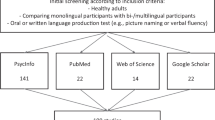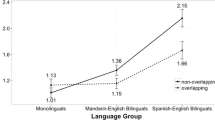Abstract
A distinction between compound and coordinate bilingualism has been employed to conceptualize linguistic organization in bilinguals. Compound bilinguals are those who acquired their languages in a joint context and therefore are presumed to store linguistic information interdependently. Coordinates include those who acquired their languages in separate contexts and therefore are presumed to maintain independent linguistic stores. To study the usefulness of this distinction, Spanish-English and English-Spanish, compound, and coordinate bilinguals were asked to give intra-and interlingual free and restricted word associations to equivalent English and Spanish stimuli for which the responses of monolingual speakers were not equivalent. As predicted, compound bilinguals gave significantly more equivalent responses and responded significantly faster than did coordinates. However, since these differences were only modest in size, they cannot be interpreted as supporting the usefulness of the compound-coordinate distinction. None of the predictions regarding the effect of proficiency on performance were supported. Differences as a function of native language, type of association task, and association conditions were obtained and are discussed.
Similar content being viewed by others
References
Dalrymple-Alford, E. C. (1968). Interlingual interference in a color-naming task.Psychon. Sci. 10:215–216.
Dalrymple-Alford, E. C., and Aamiry, A. (1969). Language and category clustering in bilingual free-recall.J. Verb. Learn. Verb. Behav. 8:762–768.
Dalton, S. (1973). Language dominance and bilingual recall.J. Psychol. 84:257–265.
Diller, K. C. (1970). “Compound” and “coordinate” bilingualism: a conceptual artifact.Word 26:254–261.
Dillon, R. F., McCormack, P. D., Petrusic, W. M., Cook, G. M., and Lafleur, L. (1973). Release from proactive interference in compound and coordinate bilinguals.Bull. Psychon. Soc. 2(5A):293–294.
Dyer, F. N. (1971). Color-naming interference in monolinguals and bilinguals.J. Verb. Learn. Verb. Behav. 10:297–305.
Ervin, S. M. (1961). Learning and recall in bilinguals.Am. J. Psychol. 74:446–451.
Ervin, S. M., and Osgood, C. E. (1954). Second language learning and bilingualism.J. Abnormal Soc. Psychol. 49 (Suppl.):139–149.
Gekoski, W. L. (1968). Associative and translation habits of bilinguals as a function of language acquisition contexts.Technical Report No. 54. USPHS Grant HD 01368, Center for Human Growth and Development, University of Michigan.
Jakobovits, L. A. (1968). Dimensionality of compound-coordinate bilingualism.Language Learning 18 (Special Issue No. 3):29–49.
Jakobovits, L. A., and Lambert, W. E. (1961). Semantic satiation among bilinguals.J. Exp. Psychol. 62:576–582.
Kintsch, W. (1970). Recognition memory in bilingual subjects.J. Verb. Learn. Verb. Behav. 9:405–409.
Kintsch, W., and Kintsch, E. (1969). Interlingual interference and memory processes.J. Verb. Learn. Verb. Behav. 8:16–19.
Kolers, P. A. (1963). Interlingual word associatons.J. Verb. Learn. Verb. Behav. 2:291–300.
Lambert, W. E. (1969). Psychological studies of the interdependencies of the bilingual's two languages. In Puhvel, J. (ed.),Substance and structure of language, University of California Press, Los Angeles.
Lambert, W. E., and Fillenbasum, S. (1959). A pilot study of aphasia among bilinguals.Canad. J. Psychol. 13:28–34.
Lambert, W. E., Gardner, R. C., Barik, H. C., and Tungstall, K. (1963). Attitudinal and cognitive aspects of intensive study of a second language.J. Abnormal Soc. Psychol. 66:358–368.
Lambert, W. E., Havelka, J., and Crosby, C. (1958). The influence of language acquisition contexts on bilingualism.J. Abnormal Soc. Psychol. 56:239–244.
Lambert, W. E., Havelka, J., and Gardner, R. C. (1959). Linguistic manifestations of bilingualism.Am. J. Psychol. 72:77–82.
Lambert, W. E., and Moore, N. (1966). Word association responses: comparisons of American and French monolinguals and bilinguals.J. Personal. Soc. Psychol. 3:313–320.
Lambert, W. E., and Rawlings, C. (1969). Bilingual processing of mixed-language associative networks.J. Verb. Learn. Verb. Behav. 8:604–609.
Lenneberg, E. H. (1967).Biological Foundations of Language, Wiley, New York.
Lopez, M., Hicks, R. C., and Young, R. K., (1974). Retroactive inhibition in a bilingual A-B A-B' paradigm.J. Exp. Psychol. 103:85–90.
Lopez, M., and Young, R. K. (1974). The linguistic interdependence of bilinguals.J. Exp. Psychol. 102:981–983.
Macnamara, J. (1967). The bilingual's linguistic performance—A psychological overview.J. Soc. Issues,23:58–77.
Macnamara, J., and Kushnir, S. L. (1971). Linguistic independence of bilinguals: the input switch.J. Verb. Learn. Verb. Behav. 10:480–487.
Olton, R. M. (1960). Semantic generalization between languages. Unpublished MA thesis, McGill University, 1960.
Penfield, W., and Roberts, L. (1959).Speech and Brain Mechanisms, Princeton University Press, Princeton, N.J.
Preston, M. and Lambert, W. E. (1969). Interlingual interference in a bilingual version of the Stroop color-word task.J. Verb. Learn. Verb. Behav. 8:295–301.
Riegel, K. F. (1965). Free associative responses to the 200 stimuli of the Michigan Restricted Association Norms.Technical Report No. 8, USPHS Grant MH 07619, Department of Psychology, University of Michigan.
Ramsey, R. M., and Riegel, K. F. (1967). Restricted associations of 12, 15, and 18 year old Spaniards.Technical Report No. 30, USPHS Grant HD 01368, Center for Human Growth and Development, University of Michigan.
Riegel, K. F. (1968). Some theoretical considerations of bilingual development.Psychol. Bull. 70:647–670.
Riegel, K. F., Ramsey, R. M., and Riegel, R. M. (1967). A comparison of first and second languages of American and Spanish students.J. Verb. Learn. Verb. Behav. 6:536–544.
Rosenzweig, M. R. (1959). Comparisons between French and English word association norms (Abstract).Am. Psychol. 14:363.
Rosenzweig, M. R. (1961). Comparisons among word association responses in English, French, German, and Italian.Am. J. Psychol. 74:347–360.
Rosenzweig, M. R. (1964). Word associations of French workmen: Comparisons with associations of French students and American workmen and students.J. Verb. Learn. Verb. Behav. 3:57–69.
Saegert, J., Obermeyer, J., and Kazarian, S. (1973). Organizational factors in free recall of bilingually mixed lists.J. Exp. Psychol. 97:397–399.
Schlosberg, H., and Heineman, C. (1950). The relationship between two measures of response strength.J. Exp. Psychol. 40:235–247.
Segalowitz, N., and Lambert, W. E. (1969). Semantic generalization in bilinguals.J. Verb. Learn. Verb. Behav. 8:559–566.
Taylor, I. (1971). How are words from two languages organized in bilingual's memory?Canad. J. Psychol. 25:228–240.
Tulving, E., and Colotla, V. A. (1970). Free recall of trilingual lists.Cogn. Psychol. 1:86–98.
Weinreich, V. (1953).Languages in Contact, Linguistic Circle of New York.
Author information
Authors and Affiliations
Additional information
This research was supported by USPHS Grant HD 01368 to Dr. Klaus Riegel, University of Michigan, and was included as one portion of a doctoral dissertation submitted by the author to the Horace H. Rackham School of Graduate Studies at the University of Michigan.
Rights and permissions
About this article
Cite this article
Gekoski, W.L. Language acquisition context and language organization in bilinguals. J Psycholinguist Res 9, 429–449 (1980). https://doi.org/10.1007/BF01067324
Accepted:
Issue Date:
DOI: https://doi.org/10.1007/BF01067324




